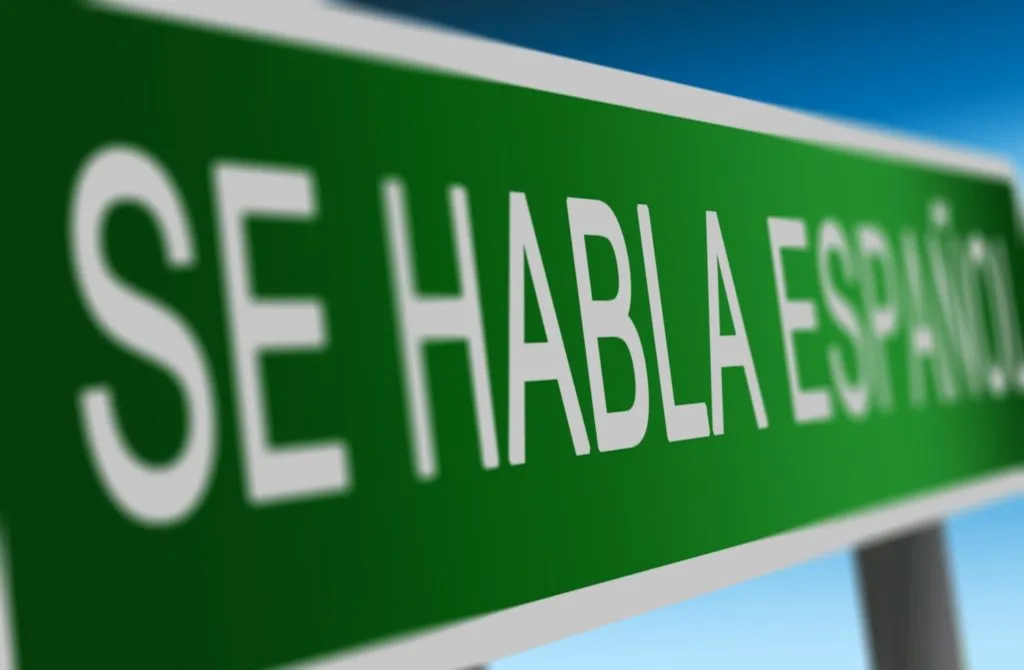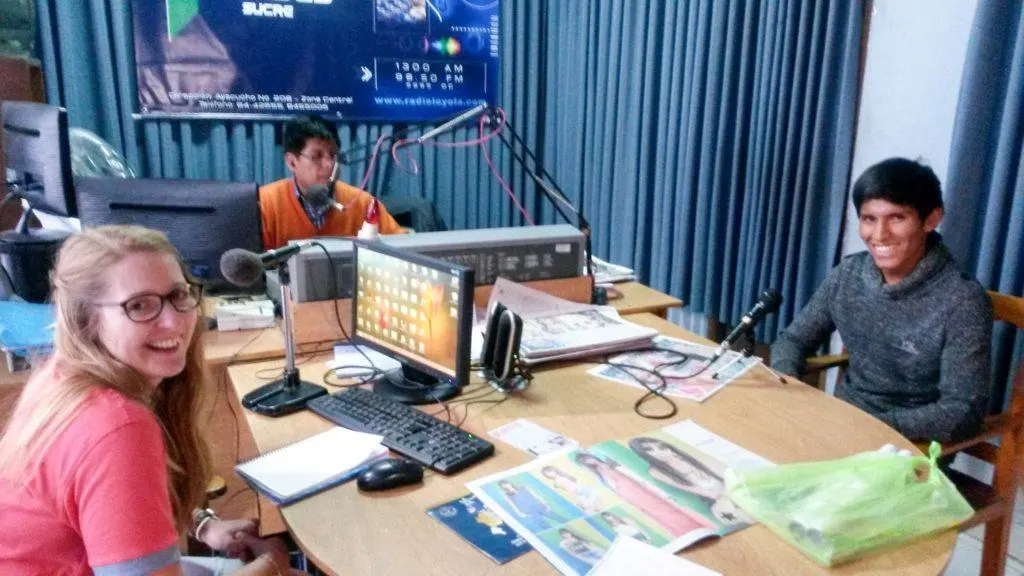I still remember that first meeting quite vividly. I had arrived in Sucre, Bolivia the previous day and decided that throwing myself directly into my new volunteering job made the most sense in the situation.
I was 6,000 miles and 18 hours from my former home of Great Britain, and alone: I hoped that jumping straight into my new regime might stave off any homesickness or worries.
I had been learning Spanish for a few months before I left the UK. How difficult could it be?
So that was how I came to be stood before my new colleagues attempting to introduce myself.
In Spanish. In worryingly broken Spanish, which had definitely seemed more useful at home in the safety of my lessons.
They smiled, they cheered and they applauded.

I’m pretty sure they understood nothing that I said.
On reflection, neither did I.
Fourteen months later, and it’s a different story.

It’s been a learning journey akin to the many overnight bus trips I’ve taken in South America: switchbacks to climb up the steepest of mountains; bumps in the road to overcome (normally at full speed); and moments where the route just makes you feel physically sick.
I’m nowhere near perfect, and I’m highly impressed when I meet other travellers or volunteers whose Spanish is much better than mine and after a much shorter time.
But I don’t feel a need to compare myself with others. It’s been a challenge – my challenge – and after each and every conversation I’ve had, I’ve emerged more victorious from my battle with learning Spanish in South America.
I can now proudly boast that much less frequently are my words greeted with a confused, head-tilted-slightly-to-the-side response.
Much more rarely does my listener have to struggle to piece together what was once a disorderly jumble of verb conjugations, direct object pronouns and definite articles.
Learning Spanish in South America has been an achievement unlike any that I have previously experienced.
I worked hard for my undergraduate and Master’s degrees, but nothing has quite compared to the victory of finally acquiring a firm, if certainly not yet perfect, grasp of another tongue.
Perhaps this sense of pride is a product of the fact that I am an Anglophone by birth; a species found across the far reaches of the globe and notoriously lacking in language skills.
Many Spanish teachers in Sucre told me how in their experience, we are those who most struggle to pick up the language. From my own interactions with travellers who I’ve met here, it’s true that the greatest proportion of those without any grasp of even the basics are native English speakers.
It’s no excuse, but learning new languages is not a skill naturally hard-wired into our Anglophone brains.
The whole process of language learning is one that we’ve barely had to encounter since the very first year of our existence, and it’s not exactly something that we can remember doing.
As most language learners become painfully aware, it’s been proven that the best time to acquire another language is between the ages of 6 and 13.
Any later, and the sections of the brain responsible for language learning slow in their growth and our attempts at becoming fluent in a language become even more futile.
For those of us learning a new language in our twenties or later, the whole experience can seem more of an uphill battle than climbing a 5,000m Bolivian mountain. Believe me: it’s tricky.
I think confidence and ability in languages can be linked to cultural attitudes in your home country.
In the UK, our lack of aptitude – or enthusiasm – is a direct product of social beliefs about the relevance of language learning.
Yes we exist in a world where our splendid success in world domination in previous centuries means that English comes only second to Mandarin Chinese for numbers of native or second language speakers, however, an incredible 75% of the world’s population still doesn’t speak a word of English.
Even those of us who studied languages at school don’t necessarily find that they’ve prepared us for the needs of life and conversation in another country.
I remember my own experiences of four months in Lausanne, Switzerland and the stark reality that despite seven years and an A grade at French A Level later, I was still nigh-on incapable of holding a basic conversation.
When I arrived in Bolivia, despite being at the grand old age of 26 and used to standing in front of a hall full of teenagers without fear, I reverted back to secondary school.
I was still scared to try and communicate in this new language. I was reminded of being 15: back then I had never discovered the confidence to throw caution to the wind and just speak.
It’s strange that language learning when you’re at school often focusses on passing written and reading tests, with a much smaller emphasis upon spoken language skills.
But these exist at the heart of why we should be learning languages: communicating with others.
Learning Spanish for me has been entirely about this: the opportunities it’s opened up to have a chat with someone at the bus stop, or more recently, to be able to deliver workshops entirely in my second language.
Ultimately, the long hours and dedication required to become fluent makes learning a language a labour of love.
But it is most definitely worth the commitment. I truly believe that the greatest parts of the process – apart from the proven health benefits and the fact that you are less likely to face Alzheimer’s or dementia – are the initial experiences of learning.
You struggle through those first onerous months of confusion and misunderstanding only to arrive, finally, at the dizzying plains of understanding, as if emerging through a blanket of fog into blindingly fierce sunshine of enlightenment.
I can’t remember the last time I was so aware of thinking.
My Spanish language learning journey has left me feeling very proud of myself.

It is possible to start from scratch and through hard work, ridiculous mistakes and long hours spent learning verbs and reading novels in Spanish, arrive at the other end.
And when you get here, you can reflect on the journey. I’ve woken myself up sleep-talking: in Spanish.
Even more terrifyingly, when I was volunteering for BiblioWorks, I made multiple appearances on live Bolivian radio and television to publicise our Festival of Reading: again, in Spanish.
These have been triumphant moments, and certainly ones which, like my initial meeting with my colleagues, will never be forgotten.
By overcoming my fear to speak, to sound stupid but, ultimately, to learn with every word that I utter, I’ve realised that learning Spanish – and a second language in general – is a way of surpassing cultural boundaries and getting under the skin of a country.
Most importantly, for me at least, learning Spanish has been a door to a completely different South America than I would have experienced without it.
Thinking of learning a language by volunteering in South America? Check out my posts about how volunteering can change your life and the ways it can even be used for a career change. And if you need a giggle, check out my post about some of my – and other bloggers’ – worst second language faux pas!

12 Travel Blogger Insights Into The Journey Of Self-Discovery Through Travel
Thursday 2nd of March 2017
[…] also learned how it’s never too late to start something new, whether it’s a language or a whole new career. I think that regardless of whether anyone wants to become a travel blogger or […]
Traveling for a Rewarding Cause – Volunteer Abroad (Part II) |
Tuesday 7th of February 2017
[…] that builds libraries in poor rural communities around Sucre, Bolivia. My main highlight was when I appeared live on Bolivian television to be interviewed in Spanish – a language I had only been learning for a few months at that point! It was also incredible to […]
Trekking with Becky
Wednesday 13th of January 2016
Acquiring another language is a labour of love, and being able to go out without a dictionary in your bag is so empowering. :D
I'm sure that this post has already inspired many, and I hope that it reaches many more. Thank you so much for sharing this on Trekking with Becky's Expat Tuesday this week - http://www.trekkingwithbecky.com/first-expat-tuesday/ - and I hope to see your post again next week! :D
Steph Dyson
Friday 15th of January 2016
Hi Becky,
Thanks for your comment and yes I will definitely be joining in with #ExpatTuesday next week! See you then :)
Megan Stetzel
Tuesday 12th of January 2016
I love attempting to learn the local languages! Your travel world expands greatly if you can communicate with locals!
Steph Dyson
Friday 15th of January 2016
Hi Megan,
I totally agree - the hard work is always worth the effort, even if it's just enough to order a meal and say thank you. People always appreciate those who try!
Amanda Williams
Friday 18th of December 2015
Well done! You have inspired me.
Steph Dyson
Friday 18th of December 2015
Thanks Amanda! It's a hard slog but definitely worth it. I'm certainly not at the end of my language journey yet so let's see what other exciting opportunities and experiences it can open up! Good luck if you choose to take up the challenge and learn a new language :)